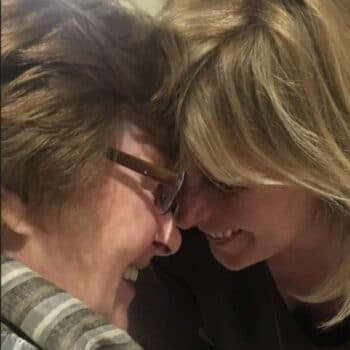Katrien Goethals

I understand now that anger is a concealed form of sadness. At one point, a health professional told me: it is the illness, not your mom. That’s when things started to get better for me, that’s when I started to see my real mom again through the illness.
October 19th, 2020
“People believe that grieving the loss of someone with dementia somehow is easier because we say goodbye so many times over. They often say the suffering is finally done. For me, that was not the case.”
During my mother’s illness, she went through phases of denial, aggression, sadness and depression, and I did not not understand any of it. It made me feel inadequate and angry. I felt badly when I lost my patience and yelled at her. I dealt with guilt when she moved into her nursing home and felt enormous sadness leaving her ‘behind’. I understand now that anger is a concealed form of sadness. At one point, a health professional told me: It is the illness, not your mom. That’s when things started to get better for me, that’s when I started to see my real mom again through the illness.
People believe that grieving the loss of someone with dementia somehow is easier because we say goodbye so many times over. They often say the suffering is finally done. For me, that was not the case.
I grieved all over. It would hit me at times I did not expect. I so badly wanted our boys to have a grandmother. It took time and there is not a day that goes by that I don’t think about her. I feel her inside me and with me at all times. Dementia is ugly. No question about it. However, I also learned a great deal about myself, my mom, life and relationships.
Here are some of the lessons I can offer:
Be an Advocate
First and foremost, advocate and speak up for your loved one and yourself. Be informed, so you have a file under the arm when you see physicians. Be insistent to get the best possible care.
Build Your Community of Support
Reach out to people or organizations who understand, who don’t judge and who can help. More importantly, accept the help. Nobody can do it on their own, and you will be so much better informed and prepared for phases to come. Stay away from unsolicited advice as people are quick to judge — only you know what is right for your family.
During the last year of my mother’s life, I decided I wanted to give back. I linked up with the Alzheimer’s Association and finished my facilitator training. I started a caregivers’ group more than three years ago which is still ongoing today. I also gave lectures at academic institutions on the stigma and awareness surrounding the illness and started a podcast for caregivers. Currently, I am taking a teacher meditation course from Eckhart Tolle which I hope to be able to share with caregivers to help alleviate stress and anxiety.
I had the pleasure of getting to know two wonderful organisations in my home of Belgium that do groundbreaking work in the field: Het Ventiel (The Valve), and the Center for Early Onset Dementia. They advocate to see the person with dementia as a person, someone who is able to still contribute to society after diagnosis. They work hard to get rid of the stigma and raise awareness.
Het Ventiel, set up by a great friend whose husband has early onset dementia, has a buddy system; families get together with other families to walk, dance, sing, do art, bike. They even horse ride! They made a documentary on families with EOD to give the illness a more ‘humane’ face and they produced a play performed by the person with dementia and their caregivers entitled “Love In Tiin times of Early Onset Dementia.” Together they fought for and succeeded in getting a formal, legal framework for caregivers to get paid time off from work so they can take care.
Live In the Now
Finally and most of all, cherish your times together. People with dementia live in the past and the now. The future does not exist. Try and live in the now. Write down memories. Look for precious moments amidst the chaos, anger and despair. Appreciate true relationships. Tell people you love them. Take care of yourself; you cannot take care of someone else if you are falling apart. Find those things in life you used to enjoy and find a few spare moments in which you can do what you love. Don’t beat yourself up, people make mistakes. There will be good days and bad days and most of us just try to do the best we can.
And when the journey comes to an end, hopefully the tears will subside and will be replaced by a smile on your face and you will remember the person for who he or she was.